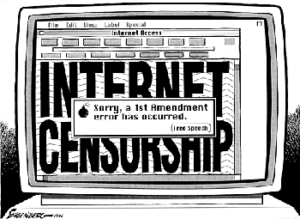
The First Amendment assures us that as American citizens we have the right to freedom of speech and freedom of the press. As true as this may be, there are certain boundaries that cannot be easily crossed when it comes to the world of the internet.
Social media platforms such as Twitter, Facebook, Instagram, YouTube and others are private companies, and they are able to censor what website users post when they deem it necessary.
While mostly all social media platforms prohibit things such as violence, hate speech, pornography, misinformation, and discrimination, there may be an unbalance when it comes to political views being shared on the internet.
Many conservative-learning internet users are convinced that tech company executives have a political bias that leans to the left.
According to the Pew Research Center, Republicans are far more likely than Democrats to say major tech companies favor the views of liberals over conservatives. After conducting a survey, the center found that “90% of Republicans say it is likely that social media sites censor political viewpoints.”
Florida state Rep.Anthony Sabatini, a Republican, wants to address that. His proposal, House Bill 33, also goes by the name “Stop Social Media Censorship Act.”
According to thebill’s text, which is provided on the bill’s website, internet users should have the right to sue if a social media website purposely deletes or censors the user’s religious speech or political speech or uses an algorithm to disfavor or censure the user’s religious speech or political speech.
The bill also states that if a social media website violates the terms set in the bill, the social media user may be awarded a minimum of $75,000 in statutory damages per post deleted or censored.
“We believe in a free, open political square where people can exchange ideas and not be penalized,” Sabatinisaid.
Sabatini singled out certain social media platforms such as Facebook and Twitter because they are widely used by the general public, and that is where his biggest concern arises when it comes to the general public being told that they can only express certain political viewpoints.
When it comes to supporters of the bill, Sabatini shared that biased censorship is something that many people want to remove from their social media.
“It’s widely shared in the public. People are very concerned about their rights of free speech and the censorship of their views. And this is something that they will widely support,” he added.
There is no companion bill in the Senate. HB 33 had its first reading earlier this month, and it has been referred to the Regulatory Reform Subcommittee; Civil Justice and Property Rights Subcommittee; and the Commerce Committee.